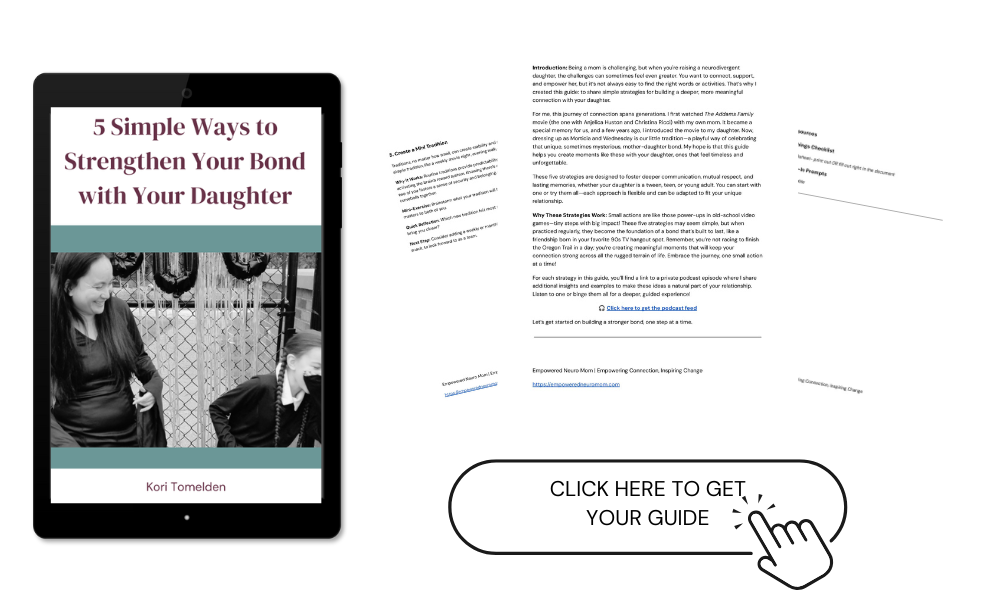As moms, we tend to be our own harshest critics, but neurodivergent moms often take self-criticism to an entirely new level. We tell ourselves things like “I’m failing” or “I’m not enough,” letting these thoughts chip away at our confidence. I’ve been there—stuck in a loop of self-doubt, listening to the lies that only made the journey harder. But over time, I learned to replace those lies with self-compassion, which has been a game-changer for both me and my daughter.
If you’ve found yourself caught in the cycle of negative self-talk, here are some common “lies” we tell ourselves and how we can replace them with words of kindness and acceptance.
Lie #1: “I’m Not Doing Enough”
The Compassionate Reframe: “I’m doing my best, and that’s enough.”
When you’re a neurodivergent mom, juggling your own needs with the demands of parenting can feel overwhelming. We often believe that we’re falling short because we aren’t doing “all the things.” But here’s the truth: you don’t have to do it all to be a good mom. What your child needs most is your presence, your love, and your understanding. Remind yourself that doing your best is enough, and that small, meaningful actions matter more than perfection.
Lie #2: “I Should Be Stronger”
The Compassionate Reframe: “Asking for help is a sign of strength, not weakness.”
Society often tells us that moms are supposed to have it all together, and as a neurodivergent mom, this expectation can feel especially heavy. But being “strong” doesn’t mean doing everything on your own. In fact, reaching out for support—whether it’s a friend, therapist, or community—takes real courage. By allowing yourself to lean on others, you’re showing your daughter that strength comes from knowing when to ask for help.
Lie #3: “Other Moms Are Doing Better Than Me”
The Compassionate Reframe: “Our journey is unique, and that’s okay.”
It’s easy to fall into the comparison trap, especially when you see other moms who seem to have it all figured out. But comparing yourself to others overlooks the uniqueness of your journey as a neurodivergent mom. Instead of measuring yourself against someone else’s highlight reel, focus on the small wins and the progress you’re making. Remember, your relationship with your daughter is one-of-a-kind, and it’s okay if it doesn’t look like anyone else’s.
Lie #4: “I Shouldn’t Feel This Way”
The Compassionate Reframe: “All feelings are valid.”
As moms, we sometimes judge ourselves for feeling frustrated, tired, or overwhelmed, as if we’re supposed to have infinite patience. But emotions are part of the human experience, and feeling them doesn’t make you a “bad” mom. Allow yourself to feel without judgment, and remember that acknowledging your emotions is the first step toward healing and growth. When you honor your own feelings, you model self-acceptance for your daughter.
Lie #5: “If I Were a Better Mom, My Child Wouldn’t Struggle”
The Compassionate Reframe: “My child’s journey is their own, and I am here to support them.”
We often internalize our children’s struggles, believing that if we were “better,” we could somehow shield them from challenges. But neurodivergent kids, like all kids, have their own paths to walk. Your role is to support and encourage them, not to eliminate every obstacle. Remind yourself that your love and guidance are what truly matter, and trust that your presence is enough to help your child thrive.
Embracing Self-Compassion as a Neurodivergent Mom
These “lies” may seem powerful, but they don’t define you. By replacing them with compassionate truths, you’re taking steps toward a healthier, more positive mindset. Self-compassion isn’t just a gift to yourself—it’s also a gift to your daughter. When she sees you practice self-kindness, she learns that it’s okay to be gentle with herself too.
If you’re looking for more ways to strengthen your bond with your daughter, I’ve put together a free guide, 5 Simple Ways to Strengthen Your Bond with Your Daughter. This guide offers simple, connection-focused ideas that can help you build meaningful moments together, no matter what challenges come your way.



Comments